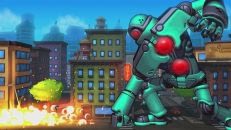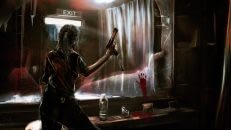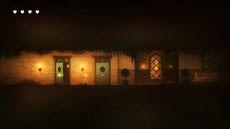A Co-Opversation With Nick Puleo On ‘SCHAR: Blue Shield Alliance’
Apparently it’s the season for journalists to pursue their game development desires. Jim Rossignol, Lewis Denby and now Nick Puleo have all somehow found time to work on their own little indie game masterpieces. We spoke to the latter of that little list there though – Mr. Nick Puleo who acts as head chef over at Co-Optimus by day, but by night he is one part of Brain Shape games who are working on their debut title, SCHAR: Blue Shield Alliance. This is to be a co-op focused twin-stick shooter experience for PC and XBLIG and from what we have seen so far it is looking good.
We’ve mentioned SCHAR in passing before but now it’s time to go face-to-face with another journalist and try to convince him to part with information about his game. We knew it wasn’t going to be easy, surely, being a journalist Nick was going to know all of our tricks. We prepared for a tough battle. Luckily, Nick was actually very giving with his answers and even parted with some exclusive screenshots for us to show you. All of that and not a single battle scar…maybe it was because Nick was alone. He is a co-op kind of guy after all, maybe he felt weak without a partner to back him up.
___________________________________________________________________________
IGM: So Nick, why did you decide to pursue becoming a game developer with Brain Shape Games as well as a journalist? You crazy cat! Has it been difficult setting up as a team and finding time to focus on running Co-Optimus as well?
Nick Puleo: Finding time, definitely. Co-Optimus isn’t even my full time gig, so development is sort of a tertiary thing I got going on. Thankfully I have some kick ass staff members at the big CO who have stepped up to help out quite a bit while I pursue something I’ve always wanted to create.
As for the team members, most have been folks I’ve worked with in the past on other various projects though I did do some broader searches for things, like hiring Sean Beeson to be our composer. Dave Paul, the lead developer on the project, has been my friend since childhood.
IGM: What are you bringing to the team personally, i.e. what role do you play etc?
NP: I’m doing a bit of everything. I’m a developer by trade and nature, so I’m doing plenty of hands on coding. I’ve also done quite a bit of planning, pre-production, goals, and PR work for the game. I put together the website and organize our strategy there too. Of course there’s play testing and iteration work to be done as well, so I’ve been doing a lot of that; gathering feedback, etc.
IGM: When you were coming up with the premise of SCHAR, what were the main ideas that the team wanted to achieve and have they been realised, would you say?
NP: The main goal for the game has always been to make a twin stick shooter that encourages cooperative behavior beyond just the “cover me” or “shoot the same guy” sort of mechanic. I think we have a few unique gameplay elements that help promote this. (* more on this answered in a later question)
IGM: One thing has to be said, another twin-stick shooter on XBLIG?! Kidding aside, what makes SCHAR different to the rest of the entries in the genre?
NP: Hey, at least I didn’t use Avatars! Twin-stick shooters may be very prevalent on the service, but there’s a good reason for that. That style of game is one of the easiest to pick up and play. That said, I think while our game is easy to pick up and play, it’s also difficult to master.
At its core Blue Shield Alliance is about the strategy of maximizing your salvage collected from a mission by working together to defend and repair generators protecting planets. Salvage is the game’s currency or experience used to upgrade your ships. This does two things. It encourages players to work together to protect a common goal, but it also forces them to fall into defined roles for collecting the salvage and protecting each other. Think of it as a hybrid between Smash TVs arcade style gameplay and Unreal Tournament’s domination mode where you need to hold areas for points.
IGM: As we could have guessed being as you’re involved with development, SCHAR is a 4-player co-op experience primarily, how have you designed the gameplay so that players have to work as a team?
NP: I mentioned a few things above, but the biggest way this happens is through the different ship types. Our four ships each have different strengths and weaknesses – some are slow, some have more firepower, some can hold more salvage. There are other things at play too, one ship has a repair bot ability that can be used to repair not only their own ship, but teammates as well.
The biggest thing is, and this is sort of the big reveal, the more salvage you carry the slower you move making you more vulnerable. If you die carrying that salvage you’ll lose a certain amount of it (plus it takes salvage to respawn). So with that mechanic we almost encourage runners, someone designated to repairing while the other players are defending him and attacking enemies. Our Potomac class, which we used to call the Mule, is essentially designed solely for co-op for this purpose. At anytime you can actually dump your salvage for another player to pick up, or simply to gain speed and outrun an enemy.
IGM: You’ve said before that you’re aiming to get the game using online play as well as local, do you think you’ll achieve this? As a follow up to that, would you say the best co-op experience will be on PC or the Xbox – considering control set-up for each person etc?
NP: To be honest, I know we won’t have online play at launch on XBIG. We really want to submit the game to the Dream Build Play challenge so we’re under the gun for a mid June release. We definitely have been intentionally designing certain things so we can plug in online play later, and perhaps online play will launch with the PC version of the game which should follow shortly after the Xbox version.
The co-op will be identical on both versions, though the PC will support Keyboard and Mouse for one player, it’s primarily a gamepad driven game. Hence the stick in twin-stick.
IGM: Have you catered for a single player experience too? If so, will this be as full as the co-op play? If not, do you plan to at any stage?
NP: Most definitely. We scale the difficulty of the levels. Enemies are harder and are more frequent if there are more players. Our Euphrates class ship is perfectly balanced too for single player. It has the ability to drop a turret that will auto target enemies, allow you to set up a defense near the generator and then go out and collect salvage. You still need to have a little bit of that team mentality in single player. And if you want or need an actual team, there is a bonus item that lets you call in AI pilots to help you.
IGM: Each of the playable ships seem to have their own style and personality, but can the player customise them in any way to better suit them?
NP: Absolutely – every ship offers upgrades like speed, armor, salvage capacity and a host of others along with weapon upgrades. If you want to make a really fast version of our heavy cruiser and pump all your salvage points into it, you can. If you’re more worried about fire power on our Rio (the light ship) you can pump points into missiles and bullets. It’s sort of like a light RPG in that you can have different “builds” of the ships to your liking.
IGM: You’ve mentioned the telling of a story but not really divulged many of the details as of yet, care to expand on this?
NP: It’s pretty hard to tell a story in a twin-stick shooter that is heavy on the action, but we definitely are trying to offer tidbits when we can as well as supplement some backstory on the official website (www.blueshieldalliance.com). We have a lot of character logs going there along with some other info to set the tone.
There are no cut scenes or anything, but there are pre-mission briefings and some in game chatter from our characters that sets up our story arc. We tried to create quirky, memorable characters with very distinct personalities. I think it comes across well in our writing. On the surface it sounds like a really serious story, but there’s a lot of light heartedness throughout.
The basis of it is this – in the future humankind expands through the stars using dark energy for faster than light travel. The problem is, the dark energy has attracted an alien race that feeds off of it and is now hell bent on wiping out humans. The only defense against these aliens is something called Element B, or Blue Matter. The generators you have to repair and protect generate shields made of Element B that protect settled planets.
IGM: Is there anything about SCHAR that you’re particularly proud of, something that you’ve always wanted to see in a game but haven’t as of yet perhaps?
NP: I’m proud of the whole damn thing. I won’t claim that we do something groundbreaking here, but I think we have a fun balance of strategy and action that isn’t often conveyed in a twin stick shooter.
IGM: You’re developing using XNA, was there a reason for this and would you recommend it to other developers?
NP: XNA is great because you can use the same code base for Xbox and PC versions. On top of that it’s a set of API calls designed specifically for games and you get a lot of stuff for free in terms of functionality. I’d absolutely recommend checking it out, even if you only want to develop on the pc, there’s a lot of great demos on the official site to get you started to and a really active community for support.
IGM: Do you think that right now is a good time to enter game development, what with the rise of indie games? Would you have bothered before?
NP: It’s probably a bit too early to really answer this. I’m doing this for fun though. I’m doing this because it’s something I’ve always wanted to do. We’ve created so many things over the years, Dave and I, but it’s always just been for fun for us and not really serious. So this is our first big “real” project and it’s pretty exciting, but at the same time it’s a lot of pressure.





